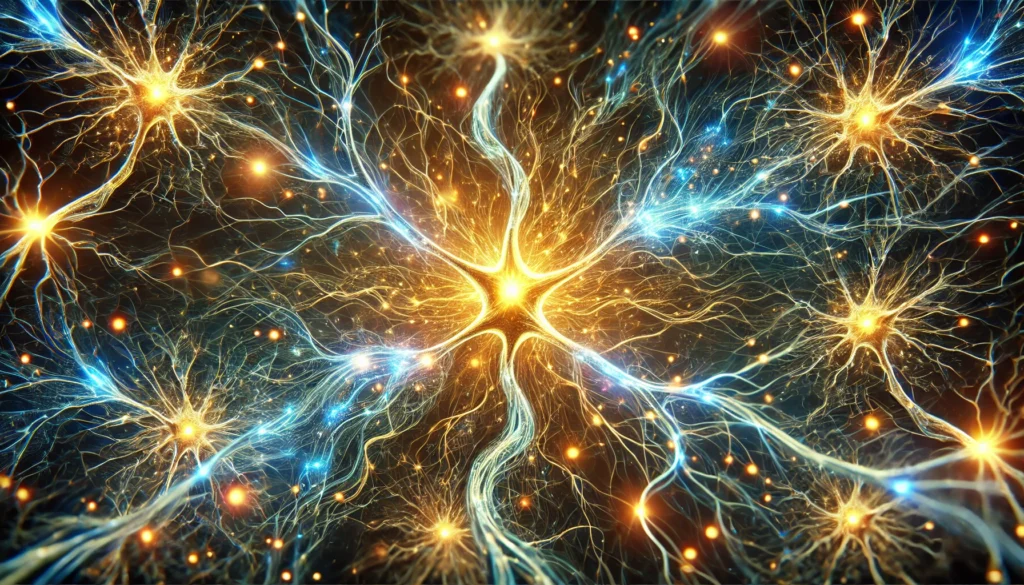Introduction
The human brain is a marvel of complexity, comprising billions of neurons that communicate through an intricate network of neural connections. These brain connections are the foundation of cognition, memory, and overall mental function. As research in neuroscience advances, scientists have discovered that strengthening neurological connections not only enhances cognitive abilities but also plays a crucial role in longevity and overall brain health. With aging populations facing an increased risk of neurodegenerative diseases, understanding how to fortify neural networks has never been more vital.
You may also like : Best Things for Brain Health: Expert-Backed Strategies to Keep Your Mind Sharp
Brain plasticity, or neuroplasticity, refers to the brain’s ability to reorganize and form new connections throughout life. This adaptability allows individuals to recover from injuries, learn new skills, and maintain cognitive function well into old age. Strengthening neural connections is key to sustaining brain health, improving mental acuity, and potentially delaying cognitive decline. By incorporating specific lifestyle changes, mental exercises, and dietary adjustments, individuals can actively support their neurological health and increase their chances of living a long, mentally sharp life.
In this article, we will explore the importance of strengthening brain connections, the scientific mechanisms behind neuroplasticity, and practical strategies to enhance neurological resilience. By the end, readers will gain a comprehensive understanding of how to support their cognitive well-being and longevity through actionable, evidence-based methods.
The Science Behind Neural Connections and Brain Plasticity
Neural connections are the pathways formed between neurons, allowing for communication and signal transmission. These pathways are vital for everything from basic motor skills to complex problem-solving and emotional regulation. When these neurological connections are strong and efficient, cognitive function remains sharp and adaptive. Conversely, weakened or damaged neural networks contribute to memory loss, cognitive decline, and conditions such as Alzheimer’s disease and other neurodegenerative disorders.
The process of neuroplasticity enables the brain to strengthen existing neural pathways or create new ones in response to learning, experience, and environmental factors. This ability is particularly evident in young children, whose brains are exceptionally plastic, allowing them to acquire new languages, motor skills, and problem-solving abilities rapidly. However, neuroplasticity does not disappear with age; rather, it remains active throughout life, offering opportunities for cognitive improvement at any stage.
Neuroplasticity occurs through two primary mechanisms: synaptic plasticity and structural plasticity. Synaptic plasticity involves changes in the strength of synapses—the junctions between neurons—based on repeated use and stimulation. This mechanism underlies learning and memory formation. Structural plasticity, on the other hand, refers to the brain’s ability to form new neurons and neural pathways in response to new experiences and challenges. Both processes are crucial for maintaining cognitive health and adaptability.
The Impact of Aging on Neural Connections
As individuals age, their neural connections naturally weaken due to various factors, including oxidative stress, inflammation, and decreased neurogenesis (the creation of new neurons). This decline contributes to slower cognitive processing, memory lapses, and an increased risk of neurodegenerative diseases. However, research suggests that aging does not have to equate to cognitive decline. By actively engaging in activities that promote neural growth and connectivity, individuals can mitigate the effects of aging on the brain.
One significant factor in age-related cognitive decline is the reduction in synaptic density. Synapses are where neurons communicate, and their deterioration leads to weakened neurological connections. Fortunately, the brain retains the ability to compensate by forming new connections, provided it receives adequate stimulation and support. Understanding the mechanisms behind this process can help individuals adopt strategies that counteract cognitive aging.

Strategies to Strengthen Neural Connections and Promote Brain Health
Engaging in Continuous Learning and Mental Stimulation
Lifelong learning is one of the most effective ways to maintain strong brain connections. When individuals challenge their minds with new information and skills, they encourage synaptic growth and enhance cognitive flexibility. Activities such as learning a new language, playing a musical instrument, or solving complex puzzles stimulate the brain and promote neuroplasticity.
Research indicates that intellectually stimulating activities can delay cognitive decline and reduce the risk of dementia. Engaging in problem-solving exercises, reading challenging materials, and participating in discussions that require critical thinking all contribute to stronger neurological connections. Moreover, activities that require multitasking and hand-eye coordination, such as playing chess or practicing calligraphy, further enhance cognitive resilience.
Physical Exercise and Its Role in Brain Connectivity
Physical exercise is not only beneficial for cardiovascular health but also plays a crucial role in supporting neurological function. Regular aerobic exercise, such as brisk walking, swimming, or cycling, increases blood flow to the brain, delivering oxygen and nutrients essential for neural growth. Additionally, exercise stimulates the release of brain-derived neurotrophic factor (BDNF), a protein that supports the survival and growth of neurons.
Studies have shown that individuals who engage in regular physical activity exhibit better memory retention, faster information processing, and reduced risk of neurodegenerative conditions. Resistance training, such as weightlifting, also contributes to cognitive health by improving insulin sensitivity and reducing inflammation, both of which affect brain function. Furthermore, activities that combine physical movement with cognitive engagement—such as dance, yoga, and tai chi—enhance coordination and reinforce brain connections through movement-based learning.
The Role of Nutrition in Supporting Neurological Connections
Diet has a profound impact on brain health, influencing neuroplasticity, inflammation, and synaptic function. Consuming a diet rich in antioxidants, omega-3 fatty acids, and essential vitamins supports the integrity of neural pathways and reduces the risk of cognitive decline.
Omega-3 fatty acids, found in fatty fish, flaxseeds, and walnuts, are critical for maintaining the fluidity of neuronal membranes and facilitating communication between brain cells. Antioxidants from berries, dark leafy greens, and nuts combat oxidative stress, a significant contributor to neuronal damage. Additionally, vitamins such as B6, B12, and folate play a role in neurotransmitter synthesis and cognitive function.
Avoiding processed foods, excessive sugar, and trans fats is equally important, as these dietary elements contribute to inflammation and oxidative stress, leading to impaired brain connectivity. A well-balanced diet, often referred to as the Mediterranean diet, is associated with improved cognitive performance and reduced risk of Alzheimer’s disease.
Sleep and Its Impact on Neural Connectivity
Sleep is an essential factor in maintaining strong neurological connections. During sleep, the brain undergoes processes such as memory consolidation, synaptic pruning, and detoxification. Poor sleep quality and chronic sleep deprivation impair these functions, leading to cognitive decline and increased risk of neurological disorders.
Deep sleep stages, particularly slow-wave sleep, are crucial for strengthening neural pathways and eliminating toxic waste products that accumulate during wakefulness. Ensuring a consistent sleep schedule, creating a restful sleep environment, and avoiding stimulants such as caffeine before bedtime all contribute to optimal brain health.

Frequently Asked Questions (FAQ) on Strengthening Neural Connections
1. How do neural connections influence cognitive function?
Neural connections serve as the foundation for all cognitive processes, including memory, reasoning, and learning. Strong brain connections allow for faster information processing and better problem-solving abilities. When these neurological connections weaken due to aging, stress, or poor lifestyle choices, cognitive decline may follow. However, research shows that individuals can actively reinforce their brain connections through activities like meditation, learning new skills, and maintaining social engagement. The more these pathways are stimulated, the more resilient and efficient cognitive function becomes over time.
2. Can stress negatively impact brain connections?
Chronic stress releases cortisol, a hormone that, in excessive amounts, damages neural connections, particularly in the hippocampus, the brain region responsible for memory. Prolonged exposure to high stress levels can shrink brain structures, weakening neurological connections and making it harder to retain and recall information. However, engaging in stress-reducing activities such as mindfulness, deep breathing, and physical exercise can counteract these effects. Studies indicate that relaxation techniques not only lower cortisol levels but also promote neurogenesis, the growth of new neurons. Reducing stress is essential for maintaining strong brain connections and ensuring optimal cognitive health.
3. How does social interaction contribute to neurological connections?
Social engagement plays a critical role in strengthening neural connections by activating multiple brain regions simultaneously. Engaging in conversations, debating ideas, and forming emotional bonds require complex cognitive processing, which reinforces brain connections over time. Research suggests that individuals who maintain an active social life experience slower cognitive decline and a lower risk of dementia. Social interactions stimulate the brain by introducing new perspectives and challenging existing thought patterns. Therefore, cultivating meaningful relationships and participating in group activities can be powerful tools for maintaining neurological resilience.
4. Are there specific mental exercises that improve brain connectivity?
Yes, certain mental exercises have been proven to enhance neurological connections by encouraging neuroplasticity. Activities such as solving puzzles, playing strategy-based games like chess, and learning new languages require sustained cognitive effort, which strengthens neural pathways. Additionally, practicing creative activities such as painting or playing musical instruments can boost brain connections by engaging multiple sensory and motor functions. Research also indicates that memory recall exercises, such as storytelling or associating words with images, can significantly enhance synaptic strength. The key is to challenge the brain consistently with new and engaging tasks.
5. How does diet affect neural connections?
Nutrition plays a crucial role in brain health and the maintenance of neural connections. Omega-3 fatty acids, found in fish, flaxseeds, and walnuts, support neuronal membrane integrity and improve synaptic function. Antioxidants from berries, leafy greens, and nuts combat oxidative stress, which can weaken neurological connections over time. Additionally, vitamin B complex is essential for neurotransmitter production, facilitating efficient brain connections. A diet high in processed foods and trans fats, on the other hand, has been linked to increased inflammation, which can impair cognitive function. Choosing nutrient-rich foods can significantly support long-term brain health and connectivity.
6. Can sleep improve the strength of brain connections?
Sleep is vital for consolidating memories and strengthening neurological connections. During deep sleep stages, the brain processes new information, eliminates toxins, and reinforces synaptic pathways. Sleep deprivation, however, disrupts this process, leading to cognitive impairment and weaker brain connections. Research suggests that getting at least 7–9 hours of quality sleep per night enhances problem-solving skills, memory retention, and emotional regulation. Establishing a consistent sleep routine and avoiding stimulants before bedtime can significantly improve neural function and overall cognitive performance.
7. How does physical activity benefit neurological connections?
Regular physical exercise enhances brain health by increasing blood flow and oxygenation, which supports neuronal function. Aerobic activities such as running, swimming, and dancing stimulate the release of brain-derived neurotrophic factor (BDNF), a protein that promotes the growth and maintenance of brain connections. Resistance training, including weightlifting, has also been shown to improve memory and executive function. Furthermore, movement-based activities that require coordination, such as yoga or martial arts, enhance motor-related neural pathways. Incorporating a variety of physical exercises can significantly improve neurological connectivity and overall cognitive resilience.
8. Can technology enhance neural connections?
Recent advancements in technology have introduced tools designed to stimulate brain connections and cognitive function. Brain-training apps, virtual reality experiences, and neurofeedback systems provide targeted exercises to enhance neural pathways. While these tools are not a replacement for traditional cognitive stimulation, they can supplement learning and memory training effectively. Additionally, wearable devices that track brain activity and provide biofeedback are becoming increasingly popular for optimizing neurological function. However, balancing technology use with real-world experiences is essential to avoid overstimulation and ensure well-rounded cognitive development.
9. What role does meditation play in improving brain connections?
Meditation and mindfulness practices have been shown to enhance brain connectivity by reducing stress and improving focus. Studies indicate that regular meditation increases gray matter density in regions responsible for attention, emotion regulation, and memory. This, in turn, strengthens neural connections and improves overall cognitive function. Additionally, meditation enhances communication between the brain’s left and right hemispheres, leading to better problem-solving and creative thinking abilities. Practicing mindfulness for just 10–20 minutes a day can significantly boost neurological health and long-term cognitive performance.
10. Can strengthening neural connections help prevent neurodegenerative diseases?
Yes, research suggests that maintaining strong brain connections can reduce the risk of neurodegenerative diseases such as Alzheimer’s and Parkinson’s. Cognitive reserve, the brain’s ability to adapt and compensate for damage, is built through lifelong learning, physical activity, and social engagement. Engaging in brain-stimulating activities, following a healthy diet, and managing stress effectively can all contribute to greater neurological resilience. While genetics play a role in disease susceptibility, lifestyle factors have a significant impact on delaying or preventing cognitive decline. By proactively strengthening brain connections, individuals can support long-term brain health and enhance their overall quality of life.

Conclusion
Strengthening neural connections is a fundamental aspect of maintaining cognitive health and promoting longevity. By understanding the mechanisms of neuroplasticity and implementing strategies such as continuous learning, physical exercise, a nutrient-rich diet, and proper sleep hygiene, individuals can enhance their brain’s resilience and adaptability. As research continues to uncover new insights into brain function, it becomes increasingly clear that cognitive decline is not an inevitable consequence of aging. Rather, with the right lifestyle choices, individuals can actively support their brain connections and enjoy a sharper, more vibrant mind well into old age. The pursuit of lifelong learning and holistic well-being remains the key to unlocking the brain’s full potential and ensuring a future of cognitive vitality and longevity.
brain health optimization, cognitive enhancement techniques, improving memory retention, neuroplasticity exercises, mental sharpness strategies, brain fitness activities, cognitive resilience tips, neurological wellness habits, boosting brain function, brain-boosting lifestyle, enhancing cognitive longevity, mind-body connection for brain health, ways to improve mental clarity, neurogenesis stimulation, exercises for brain flexibility, aging and brain vitality, lifestyle habits for brain health, cognitive function support, mental acuity improvement, brain wellness practices
Further Reading:
Exercising to keep the brain young: Latest research and expert opinions
Neural ageing and synaptic plasticity: prioritizing brain health in healthy longevity
Neurologist reveals six daily habits to boost memory naturally
Disclaimer
The information contained in this article is provided for general informational purposes only and is not intended to serve as medical, legal, or professional advice. While Health11News strives to present accurate, up-to-date, and reliable content, no warranty or guarantee, expressed or implied, is made regarding the completeness, accuracy, or adequacy of the information provided. Readers are strongly advised to seek the guidance of a qualified healthcare provider or other relevant professionals before acting on any information contained in this article. Health11News, its authors, editors, and contributors expressly disclaim any liability for any damages, losses, or consequences arising directly or indirectly from the use, interpretation, or reliance on any information presented herein. The views and opinions expressed in this article are those of the author(s) and do not necessarily reflect the official policies or positions of Health11News.


